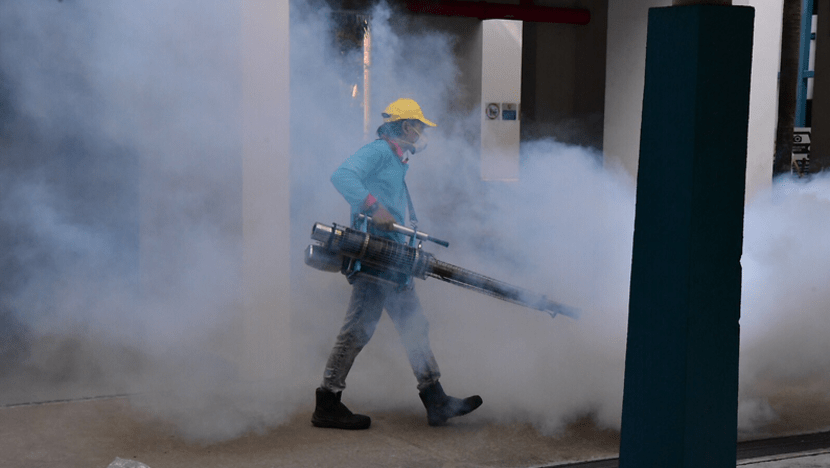Weekly dengue cases fall below 600 in September, but continued vigilance is critical: NEA
This year saw a resurgence of dengue cases in February, earlier than the traditional peak season of June to October.

A worker carrying out thermal fogging in Singapore. (Photo: Justin Ong)
SINGAPORE: Weekly reported numbers of dengue cases have fallen from a high of 1,568 in May to fewer than 600 in September, but continued vigilance is critical as cases may remain high beyond the traditional peak dengue season, the National Environment Agency (NEA) said in a media factsheet released in tandem with its annual report on Wednesday (Sep 28).
The number of dengue clusters has also declined by about 62 per cent from the high of 422 clusters in June, according to numbers from the NEA. This is despite an earlier resurgence of more than 200 weekly cases in February.
The NEA on Wednesday released its Integrated Sustainability Report 2021/2022, which provides an account of the agency's corporate, financial and sustainability performance in Financial Year 2021 and also documents NEA’s activities, achievements and financial performance.
Among this was an overview of the dengue situation, which traditionally peaks between June to October but saw signs of an outbreak earlier this year.
The report cited several factors for the resurgence, including the waning of cross-protective immunity arising from past cases, the larger mosquito population and the circulation of the less common Dengue 3 virus serotype.
The Singapore population is susceptible to a large dengue outbreak due to its low immunity towards dengue. NEA's CEO Luke Goh said: "Despite a significant decrease in dengue cases in 2021, there was a resurgence of cases at the start of 2022 signalling early signs of an outbreak. NEA and our partners rapidly strengthened vector control measures in tandem with the steady expansion of Project Wolbachia to bring the wave of cases under control."
To combat the resurgence, NEA brought forward the launch of the National Dengue Prevention Campaign, where the new purple community alert banners were launched as part of the colour-coded Dengue Community Alert System to inform residents of the dengue situation in their estate.
"Responding to early signs of an outbreak, we activated the Inter-agency Dengue Task Force for intensive source reduction efforts in anticipation of a rise in cases," said the NEA.
The alert banners were placed in non-dengue cluster areas with a persistently high Aedes aegypti mosquito population as a visual reminder for residents to take proactive prevention measures to minimise the risk of dengue cluster formation.
NEA also worked with partner agencies in its outreach efforts and jointly distributed 800,000 bottles of mosquito repellant to students in preschools, primary and secondary schools with Temasek Foundation.
To complement these efforts, NEA also released more male Wolbachia-Aedes mosquitoes at eight additional field sites since July 2022 under Project Wolbachia.
Under the project, male Wolbachia-carrying Aedes aegypti mosquitoes will mate with females, causing them to lay eggs that do not hatch, thus reducing the dengue mosquito population.
As part of enforcement efforts, the NEA conducted around 409,000 inspections across Singapore in the first half of 2022, including 2,800 inspections at construction sites. In the same period, the NEA issued fines to 1,300 households for mosquito breeding, and 6,565 legal notices to homeowners and occupiers.
The authority also issued 70 Stop Work Orders to construction sites and charged 28 contractors in court. Around 11,300 mosquito breeding habitats were detected in the first half of 2022, across all types of premises.
The NEA said: "Despite the unusual early rise in dengue cases this year, the collective efforts of stakeholders and the community have allowed us to manage the outbreak, without reaching the peak dengue case numbers seen in the huge 2020 outbreak. However continued vigilance is critical, as weekly dengue cases remain high and could continue to remain high beyond the traditional peak dengue season.
"NEA therefore urges all stakeholders to sustain dengue prevention measures, to bring down dengue case numbers further."















